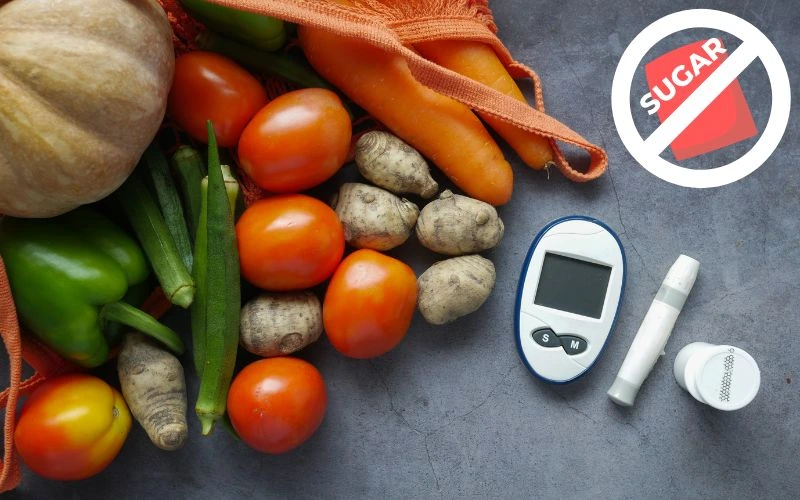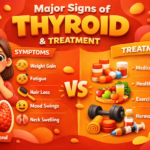Diabetes is one of the most prominent health issues in India. According to the International Diabetes Federation (IDF), India is positioned second globally in the number of diabetes cases and a significant rise in young and adolescent Indians is seen due to unhealthy lifestyles and eating habits.
Diabetes is a chronic condition where the body is not able to produce enough insulin and use the insulin produced effectively. Insulin is an essential hormone because it regulates the blood sugar levels in our body. If diabetes is not managed correctly, it can lead to abnormal blood sugar levels, that is, hyperglycemia, which causes fatigue and other serious health issues like cardiovascular or kidney disease in the long run.
Key Nutrients for a Diabetic Patient
Patients suffering from diabetes need a nutrient rich diet that aids in weight management, controlled blood sugar levels and balanced insulin production. Here are some vital components of a diabetic-friendly diet.
- Complex Carbohydrates
This is the main nutrient which can affect the blood sugar level like any other nutrient. Refined carbs, also known as bad carbs, are unhealthy for diabetics and are mostly found in white bread, sugary snacks or soft drinks.
Complex Carbs provide long-lasting energy and ensure that the glucose is released into the bloodstream slowly for stable blood sugar levels. Complex carbohydrates are found in brown rice, quinoa, sweet potato, etc.
- Proteins
Protein is a vital component for growth. It helps to digest the carbs slowly, which maintains the blood sugar levels. A protein-rich diet keeps you full for a longer duration prevents overeating, reduces sugar cravings and aids in weight management. You can include lentils, beans, paneer and tofu in your diet to add an essential amount of proteins.
- Omega-3 Fatty Acids
Incorporating omega-3 fatty acids helps to reduce inflammation, which can worsen insulin resistance. It also helps to enhance brain function and emotional well-being, which is impacted by diabetes management and stress. Food items that are rich in omega-3 fatty acids include walnuts, flaxseeds, chia seeds, etc.
- Magnesium
Magnesium improves the blood sugar levels by enhancing the function of the insulin and reducing its resistance. It improves the overall metabolic function that keeps diabetes in control. Some food items that include magnesium are spinach, almonds and dark chocolate.
- Antioxidants
Food items that are packed with antioxidants help to protect the cells and reduce oxidative stress which further minimises the risk of diabetes complications like retinopathy and neuropathy. Antioxidants reduce inflammation, boost metabolism and improve overall health functions.
You can include berries, green tea and green leafy vegetables in your diet for your daily dose of antioxidants.
- Vitamin D
Vitamin D helps to boost insulin sensitivity which helps to manage the blood sugar levels and reduce the risk of type 2 diabetes. It supports blood circulation, improves bone health, and boosts the metabolism that is required for a healthy lifestyle and diabetes management. Fortified dairy and sunlight are the ultimate sources of Vitamin D.
Role of Nutrients in Diabetes
If you follow a well-curated and proper diabetic diet chart you can control the insulin levels and produce enough insulin.
A proper diabetic diet chart will ensure that your:
- Blood glucose levels are controlled and improved.
- Reduces the risk complications associated with diabetes that include neuropathy, nephropathy, cardiac arrest, heart attack, etc.
- Reduces obesity, controls cholesterol and helps in maintaining a healthy weight.
- Decreases the need for medicines
Food Items that should be included in the Diabetic diet
Some of the food items that one should include in an Indian diabetic diet chart are as follows:
- Cereals like Brown Rice, Oatmeal, Quinoa, Ragi, Bajra, Jowar, Barley
- Pulses such as Rajma (kidney beans), chickpeas, urad dal, moong daal, masoor dal, and soya beans.
- Fruits for Diabetic patients include Apples, Custard apples, Pears, Kiwi, Papaya, Watermelon, and berries.
- Incorporate vegetables like Broccoli, Cauliflower, Bell peppers, Bitter gourd, Zucchini, Carrots and green leafy vegetables like spinach, kale, and fenugreek.
- For oil, include mustard oil, olive oil and rice bran oil.
- For sweeteners, you can use coconut sugar, jaggery powder, dates, monk fruit sweetener and stevia.
Food items to avoid in a Diabetic diet
Some food items that you should not add to your diabetic food chart are:
- Refined grains like white bread, white rice, and maida.
- Sugary snacks like candies, pastries, and carbonated drinks.
- Avoid full-cream milk, processed cheese and cream.
- Deep-fried snacks like samosa, pakoras, etc.
- Food items that contain excessive salt, like pickles, canned soups, etc.
One week Indian Vegetarian Diet Plan
We have curated a 7-day Indian vegetarian diet plan that is diabetes-friendly.
Please Note: We have created a general plan for healthy individuals but suggest you to consult a dietician or cardiologist before starting any particular diet for a safer side.
| Breakfast(7 AM- 9 AM) | Mid-Morning(11 AM) | Lunch (1 PM- 2 PM) | Evening (4 PM- 6 PM) | Dinner (8 PM- 9 PM) | |
| Day 1 | 1 cup of Masala oats with vegetables | 1 small apple with 4-5 soaked almonds | 1 cup of brown rice paired with a small bowl of mixed vegetable curry and 1/2 bowl of dal, 1 small cup of curd | 1 cup of green tea with roasted peanuts | 1 cup of brown rice with broccoli and beans Sabzi and half cup of masoor dal |
| Day 2 | 2 Moong daal pancakes with mint chutney | 1 small Guava | Millet khichdi with vegetables and 1 small bowl of curd. | Spinach Soup with handful of flaxseeds | 2 bajra roti with tofu curry and small bowl of salad |
| Day 3 | 2 small idlis with sambar and coconut chutney | 1 cup of berries | Oats khichdi with boiled vegetables and a small bowl of cucumber and beetroot salad | 1 cup of herbal tea and roasted makhana | 2 ragi rotis with paneer bhurji and small cup of sprouts. |
| Day 4 | 1 bowl of peanuts and vegetable poha | 1 small orange and walnuts | 2 bajra roti with Lauki Sabzi and small bowl of curd raita | 1 small bowl of yoghourt sprinkled with chia seeds and berries | Grilled vegetables that include carrots, zucchini, mushrooms, broccoli and 1 small bowl of tomato soup |
| Day 5 | 2 Besan Chilla with coriander chutney | 1 small bowl of mixed fruit salad | Brown rice pulao with vegetables like carrot, mushrooms and bell peppers paired with a small bowl of curd | 1 cup of buttermilk with roasted chickpeas | Quinoa khichdi with sweet potato chaat and small bowl of cucumber and carrot salad |
| Day 6 | 1 bowl of Ragi porridge | 2 slices of watermelon with flaxseeds and sunflower seeds sprinkled | Barley khichdi with grilled paneer with a small bowl of salad | 1 cup of lemon tea and handful of roasted sunflower seeds | 2 multigrain roti with methi sabzi and small bowl of beetroot raita. |
| Day 7 | Vegetable Upma with flaxseeds and peanuts | 1 small papaya | 2 bajra roti with half bowl of mixed dal and bitter gourd Sabzi with a small bowl of curd | 1 cup of milk shake made with dates, oats and berries. | 1 small bowl of dal soup and grilled tofu, broccoli and peas and corn. |
Diabetes can be overwhelming, but one can manage it efficiently with a healthy balaced diet and by staying active. You should consult with a diabetes doctor in Delhi about the current state of your diabetes and the food recommendations.
Doctors Hub provides you with a personalised diet-plan based on your preferences as they have experienced dietician in Delhi who are expert in curating diet chart according to client’s requirements. So book your appointments from doctor in Delhi and take a step towards a healthy and happy life!
Frequently Asked Questions
What are the top 4 tests for diabetes?
The top 4 tests for diabetes are as follows:
- Fasting Blood Sugar (FBS) measures the glucose levels in blood after fasting for 8 hours.
- HbA1c Test, which determines the average blood levels for the last 3 months.
- Random Blood Sugar (RBS) is used to measure the levels of glucose anytime in a day.
- The oral Glucose Tolerance Test (OGTT) checks instant glucose levels after taking sugary drinks or snacks.
Can diabetic patients eat dates?
Diabetes patients can consume dates; however, it should be in moderation because they are calorie dense. It is recommended to have 1-2 dates every day because of their low glycemic index. If you are suffering from abnormal blood sugar levels,s take consultation from your doctor, as it can spike blood sugar levels.
Is Jaggery good for diabetes?
Jaggery should not be consumed by diabetes patients because of its high glycemic index. It can spike blood sugar to abnormal levels even though it is less processed than sugar. Patients should opt for natural and low-GI sweeteners if they are craving sweets.
Are peanuts good for diabetes?
Peanuts are packed with healthy fats, protein and fibre. They monitor the blood sugar levels, keeping you full and energetic for a longer duration, which aids in efficient weight management. However, you should consume it in moderation to avoid excess intake of calories.
Is Papaya good for diabetes?
Yes, papaya is good for diabetes because it has a low glycemic index and contains fibre and antioxidants, which reduce oxidative stress and manage insulin resistance. It also boosts the metabolism and aids digestion, which is helpful in managing diabetes.
Can diabetics eat bananas?
Yes, patients with diabetes can consume bananas in moderation. You should combine your bananas with protein or healthy fats like flax seeds or sunflower seeds and opt for less ripe bananas because they generally have a lower glycemic index.
Is beetroot good for diabetes?
You can consume beetroot in moderation as it has a medium glycemic index and contains nutrients like nitrates and fibre. The antioxidant properties help to reduce the overall risk for cardiovascular diseases that can be caused due to high blood sugar levels.
Is honey good for diabetics?
Honey should not be consumed by patients suffering from diabetes because it can spike blood sugar levels and has a very high glycemic index. It is recommended to replace honey with low GI such as stevia, coconut sugar etc.
Is watermelon good for diabetes?
Watermelon can be consumed in moderation because it has a high glycemic index. However, the high water content reduces the glycemic load. Combine watermelon with healthy fats like nuts and seeds that will help to regulate blood sugar levels.
Can diabetics donate blood?
It is not advisable for diabetics to donate blood. However, if your diabetes is well controlled and insulin levels are at a moderate level, you can donate your blood after consultation with your doctor. Patients suffering from neuropathy and heart issues should not donate blood.
Is corn good for diabetics?
Corn has a medium glycemic index, so eating it in moderation and pairing it up with proteins like paneer, beans etc. can help to get the right nutrients like fiber and vitamins.













